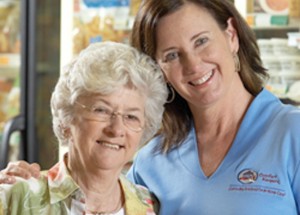By Paul Cain, Ph.D. and Donna Holm, CPA –
 Few families anticipate how challenging the rehabilitation process can be… physically, mentally and emotionally, especially when trying to meet the non-medical issues, as well as compliance with the physician’s recommendations concerning activities in general and getting back into a daily routine. It is helpful to know resources are available to assist.
Few families anticipate how challenging the rehabilitation process can be… physically, mentally and emotionally, especially when trying to meet the non-medical issues, as well as compliance with the physician’s recommendations concerning activities in general and getting back into a daily routine. It is helpful to know resources are available to assist.
For those who have been in the hospital for a serious condition or know someone who has, going back for the same condition is typically not on their mind at discharge. Yet, according to the U.S. Agency for Healthcare Research and Quality (AHRQ), 1 in 5 Medicare patients are readmitted within 30 days. Hospital readmissions within 30 days are costly for Medicare and for patients. These readmissions total about $17 billion each year. Being readmitted to the hospital can also slow down a patient’s ability to recover or cause new problems.
The Affordable Care Act has addressed this issue, in part. Some hospitals will face payment reductions and even penalties from Medicare effective October 1, 2012. For now, the three targeted conditions under the Act are heart attack, pneumonia and heart failure. It is anticipated that this list will grow. Therefore, it is in everyone’s best interest to reduce readmissions. Hospitals are now forced to stop discharging patients “quicker and sicker” in response to the economic forces bearing down on them.
AHRQ reports that the number of patients needing home health care following discharge surged by 70% between 1997 and 2008. Coming home from the hospital – as a result – isn’t as easy as it used to be. Helping patients improve their health once they leave the hospital usually entails a team approach to be successful.
Making a smooth transition from hospital to home takes planning. More often than not, many patients, and especially elderly patients, transition from hospital to home by way of a Rehabilitation Facility. Since “Rehab” offers skilled medical services on site, they are capable of reacting quickly and effectively to the daily ups and downs of recovery.
The “Physical Therapist” in charge of this area of patient recovery is the health professional who focuses on ‘the neuromuscular, musculoskeletal, and cardiopulmonary systems of the human body, as these systems relate to human motion and function’, to cite the textbook description. Obviously important functions, but that’s as far as they go.
Upon discharge from “Rehab”, additional care is usually needed. If a doctor orders “skilled care” — from a visiting nurse or physical therapist — it’s generally for just a few hours a week. Many families also choose to bring in “Home Care” to see to it that the recovery process continues as planned. This is where an ‘Interactive Care Plan’ can make a significant contribution to the effort to restore a patient’s health condition, as well as strength and confidence. The non-medical caregiver is brought in to provide help with bathing or dressing, respite or companion care, homemaker activities, transportation, medication monitoring and other individual services, usually for longer visits at substantially lower rates. The work of physical rehabilitation continues, of course, but now the emotional, cognitive and social components of re-engaging in life-sustaining activities is literally of vital importance.
‘Rehab at Home’ will continue to grow as an area for in-home health care professionals to provide their services as our population ages. Together with ‘Tele-Medicine’ –which is gaining in popularity and paid for by Medicare and some commercial carriers – and ‘Safety Technology’ – which is already available –, we should all expect the transition from hospital to home to become less stressful for all concerned in the future. After all, the goal should be: Happy Healing!
Paul Cain, Ph.D. is the Owner and Operator of ‘Comfort Keepers’® serving Northern Palm Beach County and the Treasure Coast with offices in Jupiter and Stuart.Meet Our Comfort Keepers®
Dr. Cain’s professional career has been in executive management of OTC pharmaceutical manufacturing facilities as well as in the healthcare service industry, with undergraduate and graduate degrees in philosophy, psychology and sociology. He currently serves as President of the Alzheimer’s and Parkinson’s Association of the Treasure Coast and is active as an Adjunct Professor with Indian River State College.
Donna Holm, CPA and her daughter, Darcy Holm are the Owners and Operators of ‘Comfort Keepers’® serving Central Palm Beach County, with an office in downtown West Palm Beach.
Ms. Holm has nearly 30 years experience in various accounting and operational roles, with a niche in healthcare management, and holds undergraduate and graduate degrees in accounting and management. She has received awards for the development of Best Practices and served as an Adjunct Professor with Florida Atlantic University.
Comfort Keeper® provides non-medical in-home care. All caregivers – or Comfort Keepers – in more than 650 offices nationwide are employees who are thoroughly screened, trained and oriented to the specific Care Plan for the individual client. For information – Call the local office near you or visit our website at: www.comfortkeepers.com.
HHA #: 299993443 HCS #: 228809
561.694.1950 – Jupiter/PBG | 561.833.7355 – West Palm Beach
Check Also
WHY DO I FEEL SO TIRED ALL OF THE TIME, AND NOTHING WAKES ME UP?
By Renee Chillcott, LMHC When it comes to a feeling we can’t tolerate and want …
 South Florida Health and Wellness Magazine Health and Wellness Articles
South Florida Health and Wellness Magazine Health and Wellness Articles




